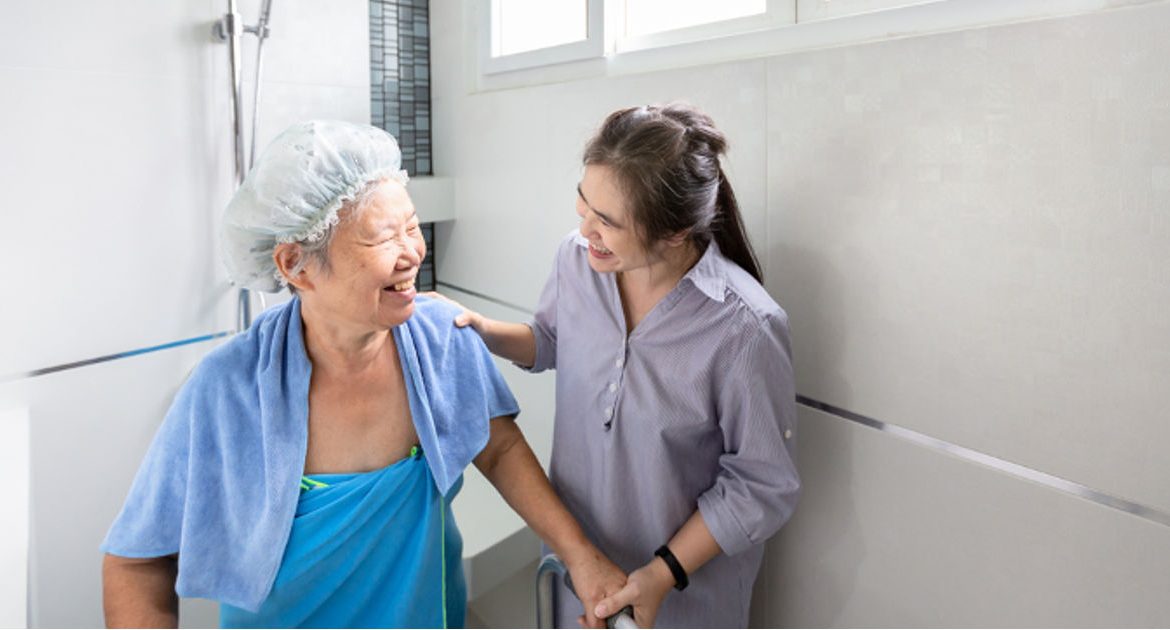Did you know that Leading Edge Senior Care has a Dementia Support Group? We meet monthly in Mesa. For more details <click here>
What to do if Your Elderly Parent Refuses to Bathe?
What to do if your elderly parent refuses to bathe? This is not a new issue in, in-home senior care. Whether the care is done by an agency or you as their personal caregiver. There are many reasons that seniors refuse to bathe, these include the beginning stage of dementia, fear of falling, depression, pain, or feeling exhausted. Figuring out why their
bathing habits have changed is the best way to devise a plan that will encourage your elderly parent to bathe. That way you have a plan and understanding of what to do if your elderly parent refuses to bathe.
Poor hygiene can cause body odor and an untidy appearance; although extreme changes in hygiene can border on self-neglect, affect a senior’s quality of life, and even have a negative impact on their health.
Bathing is an important part of personal hygiene that is why it is crucial to find a way to help your elderly parent to overcome the issue that they are having with bathing. If your elderly parent is refusing to bathe, try these following steps:
Talk to your parent.
Seeing your parent in a messy state can cause you to feel frustrated and not truly understand what is happening. You want to approach your parent in a calm, loving manner to try to gain understanding into what is going on with your loved one and what is the root cause of the change in their bathing habits. Never argue or scream at your loved one, this will just
make the situation worst. Yelling will never resolve the situation; it will only make it worse.
Never be Demanding
Telling your mom or dad in a bossy, demanding tone that he or she needs to take a bath will not change their outlook on bathing. This approach will come off demeaning and will not be well received. Also constantly nagging or insisting that he or she needs to bathe will cause him or her to shut down or become argumentative, the best approach is to have a
conversation in a positive tone.
Are There Physical Reasons Your Parent is Not Bathing?
Take into consideration any physical challenges your mom or dad may have. Examples of this include your parent experiencing dizziness, having difficulty bending, or their arthritis may make it difficult to wash his or her back and hair. Your parent may be afraid of falling in the shower; this can be easily fixed with a few modifications to the bathroom. You can add grab bars and a shower chair to make the shower safer. If you are able to remodel the bathroom, change the tub or shower into a walk-in shower so he or she doesn’t have to step into the shower or bathtub. Your loved one may not be comfortable with you helping
him or her but may allow a professional caregiver to assist with bathing.
Make the Bathroom Comfortable
When the bathroom is cold, seniors are not comfortable getting a shower because he or she gets a chill when getting out of the shower. Warm the bathroom with a space heater for a few minutes before he or she is ready to take a shower. Have a warm fluffy towel ready for your loved one when he or she gets out of the shower, you can warm the towel in
the dryer for a few minutes. Taking a few extra steps will make bathing a pleasant experience, instead of him or her relating it to shivering and being cold.
Have a Routine
When you establish a routine, whether it is daily or a few days a week; this will help your loved one know what to expect and it becomes part of their routine like eating. Buy scented lotion or perfume/cologne that he or she can use after their shower. Also on bathing days, either have someone come and visit or have a place for your loved one to go. Having a reason to bathe will make him or her feel that the effort is worthwhile when there is a positive end result. It will give your parent something to look forward to instead of just saying you need to bathe.
If you are unable to create a routine for your loved one or he/she is not comfortable with you assisting with their personal care, hiring a professional caregiver is a great option that can benefit your mom and dad. Sometimes it is best for the children to just spend time with their parents and not become the caregiver. Routine is the key and having a plan in place to be successful when you are asking “What to do if Your Elderly Parent Refuses to Bathe?”

